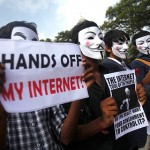On 24 March India’s Supreme Court struck down Section 66A of the Information Technology Act as unconstitutional because it infringes on freedom of expression.
While this is an important and necessary move, and one more milestone in the complex global process of balancing free expression, privacy and security, it will not be sufficient to protect freedom of expression either on the Internet or in other fora.
In India the future still depends on an intensive vigilance by citizens to counter not just government moves to curtail free expression but also efforts by fundamentalist forces which demand bans of films or books and are willing to use violence to enforce their will.
These battles are set to intensify since the same ruling by the Supreme Court upheld section 69 A of the IT Act which allows the government to block certain websites in cases where the posted content could foster communal disturbance, social disorder or affect India’s relations with other countries.
There are conflicting assessments about whether internet freedom is on the rise or declining across the world. Amnesty International has been working with Google, Yahoo and Microsoft since 2002 to set up multi-stakeholder initiatives in different parts of the world to support free expression on the internet – including legislative advocacy.
These efforts have met with mixed results. For example, there is as yet no decisive assessment on whether such efforts are making a dent in what has come to be known as The Great Firewall of China – a system of blocks which prevents the Chinese people from accessing much of the Internet.
India’s greatest advantage in this respect is not only a strong constitutional basis for freedom of expression but a vibrant and diverse civil society mobilization. India is also perceived to be ahead of its neighbors in deploying digital technology and the internet to make governance more transparent and accountable.
The Supreme Court judgement will now hopefully deter political leaders from arresting people for what they post on the internet – it was such arrests that led several citizens to petition the court against Section 66A of the IT Act.
Such citizens activism, bearing upon the judicial and legislative process, will be vital going forward. The future also depends on a social and cultural movement in favor of greater tolerance in public life so that diverse, even offensive, opinions can be freely expressed.
Soli Sorabjee, a former Attorney General of India who argued for one of the petitioners in case against Section 66 A, put it in a nutshell at a public lecture in Mumbai recently: ‘The duty to practice tolerance is not just a goody-goody attitude, it is essential in a diverse society. Tolerance is a pre-requisite for progress, development and growth. Is this all Utopian? But any map of the world that doesn’t have a Utopia is worthless.’
Rajni Bakshi is Senior Gandhi Peace Fellow, Gateway House.
This blog was exclusively written for Gateway House: Indian Council on Global Relations. You can read more exclusive content here.
For interview requests with the author, or for permission to republish, please contact outreach@gatewayhouse.
© Copyright 2015 Gateway House: Indian Council on Global Relations. All rights reserved. Any unauthorized copying or reproduction is strictly prohibited.


